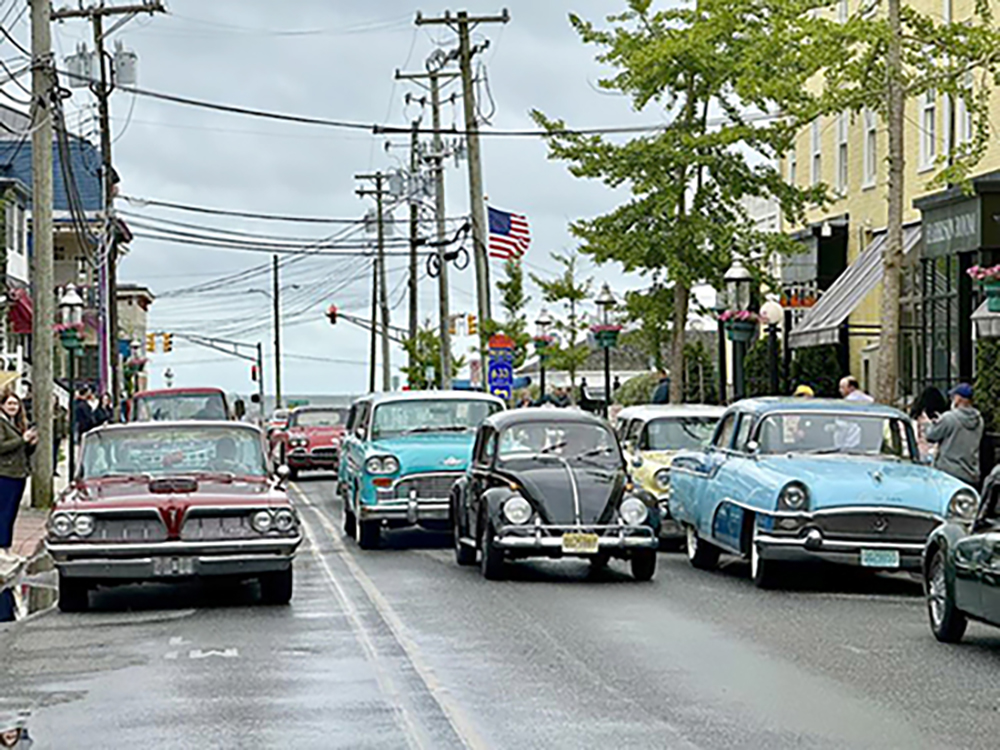By William Sokolic
Fred Borsani has made subs for Dino’s Subs and Pizza in Margate for years. He could probably make them in his sleep, But on June 5, Borsani had a little extra on his plate at the shop. He made Stephen Dorff a sub.
Dorff, Brad Furman and Shirley MacLaine, all Hollywood A-listers, spent much of the day in Dino’s, along with a filmmaking crew. They were all there to film a scene for an independent movie tentatively called “People Not Places.”(There is some chatter it might be retitled, “Margate Memories.”)
The production is one of an increasing number set in South Jersey, with more coming in the fall. “Ezra,” filmed in Central and North Jersey, included Stefanie Ryan-Manhim, president of Galloway Township’s Weist-Barron-Ryan acting studio as one of the casting directors. Filmed in 2023, “Ezra” is in theatrical release with Bobby Cannavale, Robert De Niro, Rose Byrne, and as the title character, newcomer William Fitzgerald.

In the Bob Dylan biopic, the Jersey Shore was chosen to portray Newport, RI because of favorable tax breaks there.
“We had worked with the producer on several other projects, and they were aware that we have trained neurodivergent actors,” Ryan-Manhim says of a film that featured an autistic child as the title character.
Filming wrapped earlier in the spring in Cape May on “A Complete Unknown,” a Bob Dylan biopic, starring Elle Fanning and Timothée Chalamet as Dylan.
And reports swirl that Margot Robbie, fresh off the success of “Barbie,” will do a film based on the popular board game, Monopoly. The original game based its streets on those in Atlantic City. Kevin Hart is believed to be attached as the lead.
So, what gives with all this play in New Jersey? Tax credits, for sure.
“One hundred percent,” Ryan-Manhim says.
In 2018, the state adopted among the highest credits in the country—a fact not lost on moviemakers—and the number of productions rose as a result. The Atlantic City Film Commission works closely with studios and the New Jersey Motion Picture and Television Commission to bring projects to the area. So does Weist-Barron-Ryan.
“Atlantic City has everything from glitz to grime (as any good city should to film in),” Ryan-Manhim says. “And we have lots of local actors who will work as local hires and we know who most of them are. This helps to keep production costs down when not having to cover travel expenses.”
Furman’s film, based on a script by his mother, Ellen, had more of a local connection beyond tax credits. The Furman family has long maintained a vacation residence in Ventnor. “The producer has roots in this area and the story was written for Atlantic City,” says Heather Colache, director of the Atlantic City Film Commission.
At 90, the iconic MacLaine plays an elderly resident of Ducktown in Atlantic City, where she befriends Dorff, a homeless man. She also struggles to mend her troubled relationship with her son.
“This is absolutely a labor of love for Shirley, my mother and me.,” Furman told Deadline.
Says MacLaine, “It’s a wonderful script.”
The story takes them to Dino’s where MacLaine buys Dorff something to eat.
“I make a sandwich for the guy, and she gives it to him. ” Borsani says. “It was a fun experience.”

A set in Cape May during the filming of a Bob Dylan film titled “A Complete Unknown”. Photo credit: Benjamin Howard
Francizka Brugger, a longtime employee at Dino’s, was not part of the actual filming, but she got a taste of the unglamorous part of making movies, when she hung around behind the sub shop during the day. “It took almost ten hours to film.”
While Ellen Furman’s screenplay called for Atlantic City and Margate, others see New Jersey as replicating different locales. The Dylan film focuses on the events at the Newport Folk Festival in 1965. Dylan received a chilly reception from folkies when he stepped on stage with a rock band backing him up. The incidents involved in the storyline do not take place in Cape May, but the resort can pass for Newport, R.I. in 1965.
“We do have films that look at Atlantic City for different scenes that can easily be another country or state,” Colache says. Plus, Atlantic City does not charge for permits and has lower rental costs for police, fire, and palatable location fees, in addition to the tax breaks.
New Jersey offers a 30-35% tax incentive, along with a 2 or 4% enhanced tax credit for productions with at least a 25% diverse cast/crew mix—an incentive that studios and networks are happily putting to use when hiring crews here in New Jersey, says Jon Crowley, executive director of the state film commission. It should be noted that Hollywood spent almost $600 million in New Jersey last year, representing a great return on the state’s incentives legislation, Crowley says.
One meaningful metric to consider when measuring the economic impact for productions is the average spend per day of shooting, Crowley says. In 2017, the year before the tax credit program was created, the industry spent $67 million in New Jersey over 2,784 shoot days, with an average daily spend of $24,089. In 2023, with a total industry spend of $592 million over 2,761 shoot days, the average per shoot day rose to $214,538.
Sixty percent of the total film production expenses (exclusive of post -production costs) must be incurred for services and goods purchased through vendors authorized to do business in New Jersey, Colache says. Qualified film production expenses (expenses incurred in New Jersey for the production of a film) must exceed $1 million per production.
Aside from the tax breaks, New Jersey established a program known as Film Ready in which various municipalities participated in a workshop seeking certification as a film-friendly town. “We had a film ready workshop in South Jersey in September for 30 towns,” Crowley says.
Most of the towns that attended—covering six counties—are currently involved in the certification process. An announcement will be made in August as to the South Jersey towns involved. As a result of the Film Ready program, three projects are in various stages of development or pre-production to shoot in South Jersey in late Summer/early Fall.
Most producers and location managers start their journey with the Atlantic City Film Commission, the New Jersey Motion Picture and Television Commission, which verifies productions, and the casting agency.
“We are members of the Location Managers Guild and the Association of Film Commissioners International,” Colache says. “I’ve attended film shows in Los Angeles and Santa Monica and conducted a film sales mission to major studios right after Covid with cooperation with the film and television commission. We were the first offices to meet with the studios after Covid. All of the networking and cooperation with the New Jersey Film Office and Reel Scout on our website help keep Atlantic City visible as a great place to film.”
William Sokolic is a veteran journalist who has written for daily, weekly and monthly publications. He’s covered a wide range of news, features and entertainment stories. Much of his work concerns tourism, Atlantic City, and the gaming industry.













